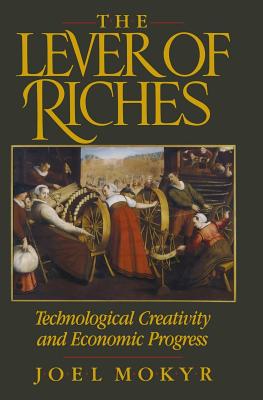

 Oxford University Press, USA
Oxford University Press, USA
The Lever of Riches: Technological Creativity and Economic Progress


Key Metrics
- Joel Mokyr
- Oxford University Press, USA
- Paperback
- 9780195074772
- 7.95 X 5.3 X 0.7 inches
- 0.69 pounds
- History > World - General
- English
 Secure Transaction
Secure TransactionBook Description
Beginning with a fascinating, concise history of technological progress, Mokyr sets the background for his analysis by tracing the major inventions and innovations that have transformed society since ancient Greece and Rome. What emerges from this survey is often surprising: the classical world, for instance, was largely barren of new technology, the relatively backward society of medieval Europe bristled with inventions, and the period between the Reformation and the Industrial Revolution was one of slow and unspectacular progress in technology, despite the tumultuous developments associated with the Voyages of Discovery and the Scientific Revolution.
What were the causes of technological creativity? Mokyr distinguishes between the relationship of inventors and their physical environment--which determined their willingness to challenge nature--and the social environment, which determined the openness to new ideas. He discusses a long list of such factors, showing how they interact to help or hinder a nation's creativity, and then illustrates them by a number of detailed comparative studies, examining the differences between Europe and China, between classical antiquity and medieval Europe, and between Britain and the rest of Europe during the industrial revolution. He examines such aspects as the role of the state (the Chinese gave up a millennium-wide lead in shipping to the Europeans, for example, when an Emperor banned large ocean-going vessels), the impact of science, as well as religion, politics, and even nutrition. He questions the importance of such commonly-cited factors as the spill-over benefits of war, the abundance of natural resources, life expectancy, and labor costs.
Today, an ever greater number of industrial economies are competing in the global market, locked in a struggle that revolves around technological ingenuity. The Lever of Riches, with its keen analysis derived from a sweeping survey of creativity throughout history, offers telling insights into the question of how Western economies can maintain, and developing nations can unlock, their creative potential.
Author Bio
Joel Mokyr conducts research on the economic history of Europe, and specializes in the period 1750-1914. His current research is concerned with the understanding of the economic and intellectual roots of technological progress and the growth of useful knowledge in European societies, as well as the impact that industrialization and economic progress have had on economic welfare.
He is a Fellow of the American Academy of Arts and Sciences, the Econometric Society, and the Cliometric Society as well as the British Academy, the Italian Accademia dei Lincei and the Dutch Royal Academy. He has been the President of the Economic History Association, editor in chief of the Oxford Encyclopedia of Economic History, and a co-editor of the Journal of Economic History.
He is currently co-editor of a book series, the Princeton University Press Economic History of the World. He was the 2006 winner of the biennial Heineken Award for History offered by the Royal Dutch Academy of Sciences and the winner of the 2015 Balzan International Prize for economic history.
His latest book is A Culture of Growth: Origins of the Modern Economy, to be published by Princeton University Press in 2016. He has supervised over forty doctoral dissertations in the departments of Economics and History.
Research Interests
- Geographic Field(s): Modern European History: Britain and Its Empire; Global History
- Thematic Field(s): Economic and Labor History; History of Science, Technology, and Medicine
- Principal Research Interest(s): Economic History
Source: Northwestern University
Videos
No Videos
Community reviews
Write a ReviewNo Community reviews